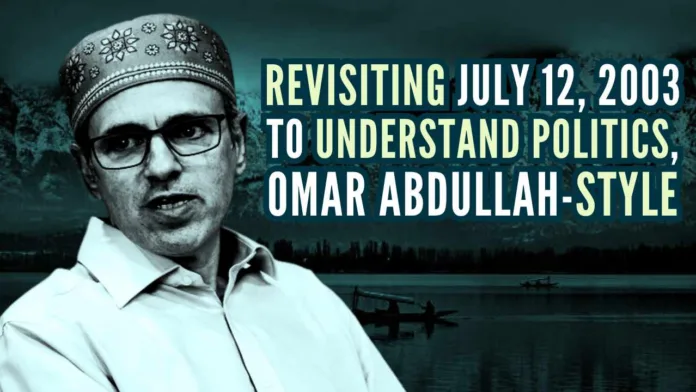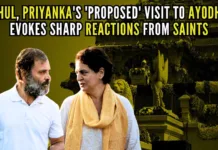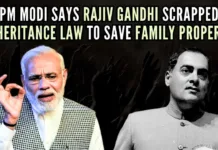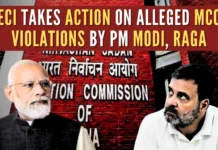
Kashmir My core constituency
On July 12, 2003, Kashmir-based National Conference (NC) president, Omar Abdullah, announced the “termination” of his party’s ties with the National Democratic Alliance (NDA). He also “ruled out the possibility of any tie-up with successive governments at the Centre in “foreseeable future.” But more than that, he declared that “the Valley of Kashmir would continue to be the NC’s ‘core constituency’ and the party would persist with its struggle to achieve greater autonomy for Jammu and Kashmir (J&K.”
Actually, that day, Omar Abdullah addressed a press conference at the Srinagar Nawai Subah headquarters of his party and said: “The NC working committee, which deliberated over the issue, had taken the ‘final and absolutely unanimous’ decision to withdraw from the NDA.” He also said: “The party had snapped its unilateral and dysfunctional relationship with immediate effect.”
“I believe the policy of seeking greater autonomy for Jammu and Kashmir and protecting Article 370 is the right one…The Valley of Kashmir had been and would continue to be the ‘core constituency’ of his party…Unfortunately, over the last few years, we tended to be Delhi’s voice in Jammu and Kashmir rather than Jammu and Kashmir’s voice in Delhi. We are certainly going to correct it.”
Omar Abdullah, who worked as MoS in the Ministry of External Affairs and other departments in the Atal Behari Vajpayee’s government for three long years, conveyed his party’s decision to the convenor through a Fax immediately after the press conference.
It bears recalling what he said while explaining the cause of action. He, inter-alia, said: “After the last Assembly elections the NDA government had adopted the State Chief Minister Mufti Sayeed as its ‘more important ally’ and the functional relationship between the NC and the NDA had ceased to exist. ‘On several occasions, we took our own line on issues like talks on J&K. Farooq Abdullah’s suggestion that a person like Nelson Mandela be involved with the process had further strained our relationship with the Centre. We would no longer see eye to eye…The Central government’s ‘total silence’ over the communal riots in Gujarat and recently over the infamous Best Bakery verdict had further pushed NC to the wall.”
(14 people were killed at the Best Bakery in Vadodara, Gujarat, on March 1, 2002, following an attack by a group of 1,000 people after the Godhra episode – the anti-Karsevaks’ elements had set on fire the train at Godhra, which took away the precious lives of scores of Karsevaks. The Gujarat Police had booked 21 people on murder charges but in 2003, a Vadodara court acquitted all the accused.)
Omar Abdullah also revealed that “as a Member of Parliament and as a Minister he would always regret two things: ‘I should not have supported POTA and I should have resigned immediately after the (2002) Gujarat riots…The NC was regretful of all human rights violations committed since 1989, including those which took place in the last six years of its (in this case NC) own regime…”
Perverted ideology
What Omar Abdullah said on July 12, 2003, cleared many cobwebs of confusion:
- One, he publicly acknowledged that he and his outfit were fundamentally Kashmir and Kashmiri-Muslim-centric and rabidly anti-Jammu, which was and continues to be, overwhelmingly Hindu, and anti-Leh, which was and is predominantly Buddhist. In other words, he candidly and shamelessly told the people of Jammu and Ladakh that they were no more than subjects of Kashmir; that they had no other option but to survive on the crumbs the Kashmiri politicians would throw at them as before; and that Kashmir and Kashmiri Muslims were their masters.
- He clearly and in unequivocal terms advocated separation not only of Kashmir but also of Jammu and Ladakh, from Bharat by pointing out that the Kashmir Valley was and shall continue to be the core constituency of the NC and that the NC was only for a limited accession with Bharat. His remarks on Article 370 only served to indicate that he was a highly perverted ideology and that he and the NC stood for further widening the already rather wide politico-constitutional gulf between J&K and the rest of the country.
- His unflinching support for the idea of making Nelson Mandela help resolve the so-called Kashmir issue also served to demonstrate that he, like other Kashmiri politicians of all shades of opinion, considered Jammu and Kashmir a disputed territory whose political future was yet to be decided. His suggestion that the NC should not have become the voice of New Delhi in Kashmir and that Kashmir should become the voice of New Delhi further established his hatred for Bharat and lust for absolute political, legislative, judicial, and financial powers.
- As for the cause of action – termination of ties with the NDA – and his views on the so-called human rights abuses in Kashmir, the less said the better. Suffice it to say that he was a communalist of communalists, fanatic of fanatics, and inhuman. Life of the Hindus had, and has, no place in his ultra-communal scheme of things. One more sentence can be added: that day, he and the NC swung solidly behind separatists and terrorists of all varieties, or anti-state actors, who had been attacking the symbols of Bharat State in Kashmir, targeting and butchering the hapless and abandoned minority Hindus, Dogras of Jammu and Punjabis with separation of Jammu, Kashmir, and Ladakh as their most cherished goal. To be more precise, he vouched for what is called “deep state.”
Fractured mandate, coalition government
It needs to be noted that Omar Abdullah had virtually usurped the office of party chief from his father, Farooq Abdullah, in 2002, and brought down the strength of NC MLAs in the 2002 assembly elections from 57 in 1996 to just 28 — 29 less than the 1996 tally under Farooq Abdullah’s leadership. It was also in 2002 that Kashmir for the first time in its electoral history produced a fractured mandate with the newly-formed Peoples Democratic Party (PDP) of pro-self-rule and pro-Pakistan former Union Home Minister, Mufti Sayeed, and his ultra-radical daughter, Mehbooba Mufti, upsetting the NC’s applecart. The PDP won 16 seats, all from Kashmir and particularly from two districts – Anantnag and Pulwama. That’s the reason it was also called “TDP” (two-district party). It was also for the first time that a coalition government consisting of the PDP, the Congress, the CPIM, the People’s Democratic Front (PDF), and J&K National Panthers Party (NPP) was formed in J&K with Mufti Sayeed becoming the first-ever Chief Minister of coalition government in the sensitive border state.
Conclusion
It is hardly necessary to write a conclusion. c. Indeed, the causes of communal unrest in Kashmir and the political secession are Abdullahs and ilk in Kashmir, who masquerade as “mainstream” politicians but subvert the polity while in power and while out of power like they have doing after June 2018, when J&K came under the Central rule.
Note:
1. Text in Blue points to additional data on the topic.
2. The views expressed here are those of the author and do not necessarily represent or reflect the views of PGurus.
For all the latest updates, download PGurus App.
- ‘Kashmir My core constituency’: Revisiting July 12, 2003 to understand politics, Omar Abdullah-style - March 15, 2024
- Total deviation from traditional approach: Seven takeaways from PM Modi’s March 7 Srinagar visit - March 9, 2024
- Status of political parties: Why is further J&K reorganization imperative? - March 1, 2024










